10 Renovations That Will Hurt Your Home's Value
Renovating your home is an opportunity to increase its value, but be cautious. These 10 renovations can actually hurt your home's value and turn potential buyers away.
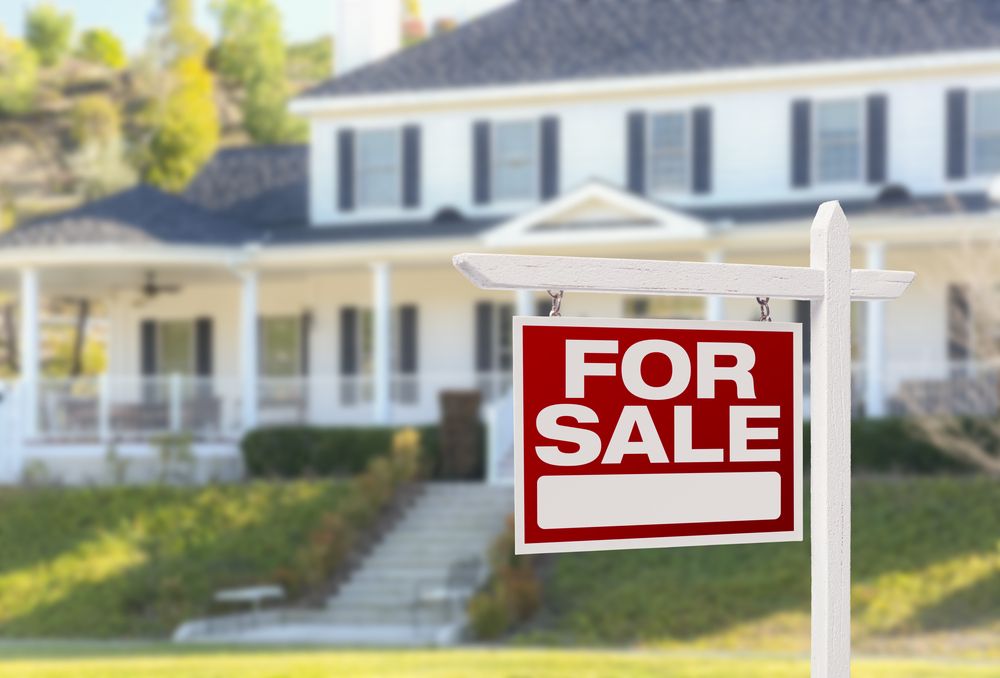
Home renovations are an exciting opportunity to improve the functionality and aesthetics of your living space. We recently wrote about renovations that offer a great return on investment, but not all projects are created equal in terms of adding value to your property.
In fact, there are certain renovations that can actually decrease the value of your home and deter potential buyers in the future. In this post, we'll guide you through the top eight home renovation projects that you should avoid if you're looking to preserve or enhance your home's value.
Before you renovate
While your home should be comfortable and reflect your tastes, you have to keep in mind that certain home projects can actually harm your home's value. Even if you plan on staying in your home for a long time, you want to preserve or enhance its value when you're ready to sell.


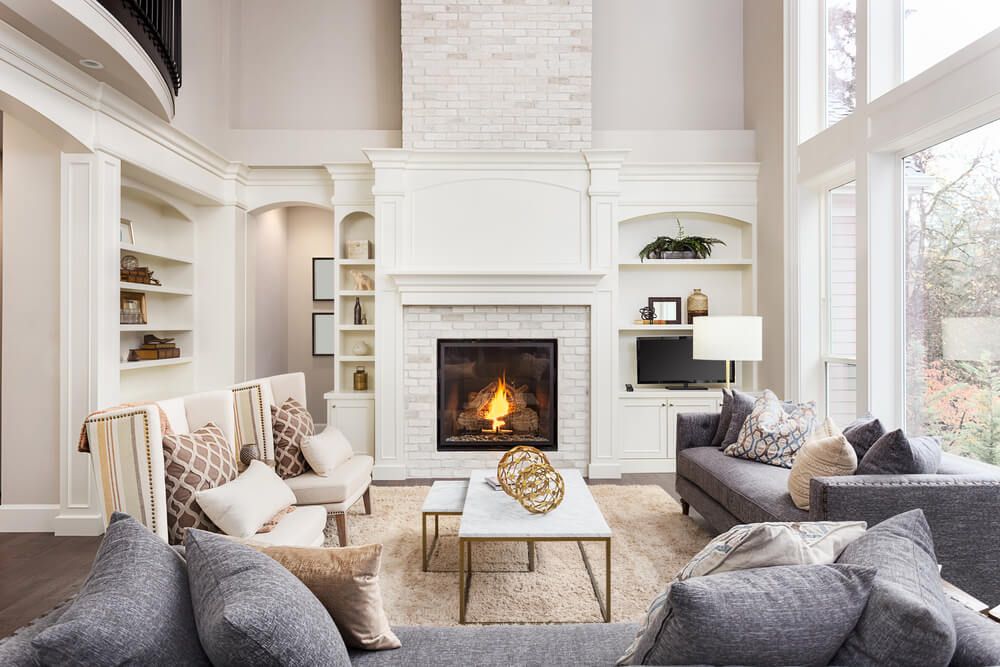
1. Removing or combining bedrooms
Combining bedrooms into bigger rooms might seem like a good idea, but you should think twice before knocking down walls. While open floor plans are desirable, reducing the number of bedrooms can significantly decrease the value of your home.

Bedrooms are valuable assets as they provide private spaces for family members or can be repurposed as guest rooms or home offices. Reducing the number of bedrooms limits the potential buyer pool and may devalue your property. For example, a four-bedroom home converted to a three-bedroom with a walk-in closet may appeal to fewer buyers with larger families or those who value extra space.
2. Overdone bathrooms and kitchens
While bathrooms and kitchens are prime areas to focus on during home renovations, going overboard with extravagant finishes, high-end fixtures, and excessive customization can actually reduce your home's value. Not all buyers may be willing to pay a premium for lavish features, and trends can quickly become outdated.

Opt for a balance between style and functionality, considering timeless design elements and the preferences of potential buyers in your market. This approach will help ensure that your renovations contribute to your home's value rather than hinder it.

3. Removing bathtubs
Bathrooms are essential and highly valued spaces in any home. Removing or dramatically altering bathrooms, such as eliminating a full bathroom to create a larger suite, can be risky. The number of bathrooms in a house is a significant factor for potential buyers, and reducing this number may negatively impact the home's value.

Removing a bathtub to build a massive walk-in spa shower can also be a costly renovation that will hurt your bottom line in the future. Many people, including families, prefer at least one bathroom with a tub, so think twice before getting rid of it.
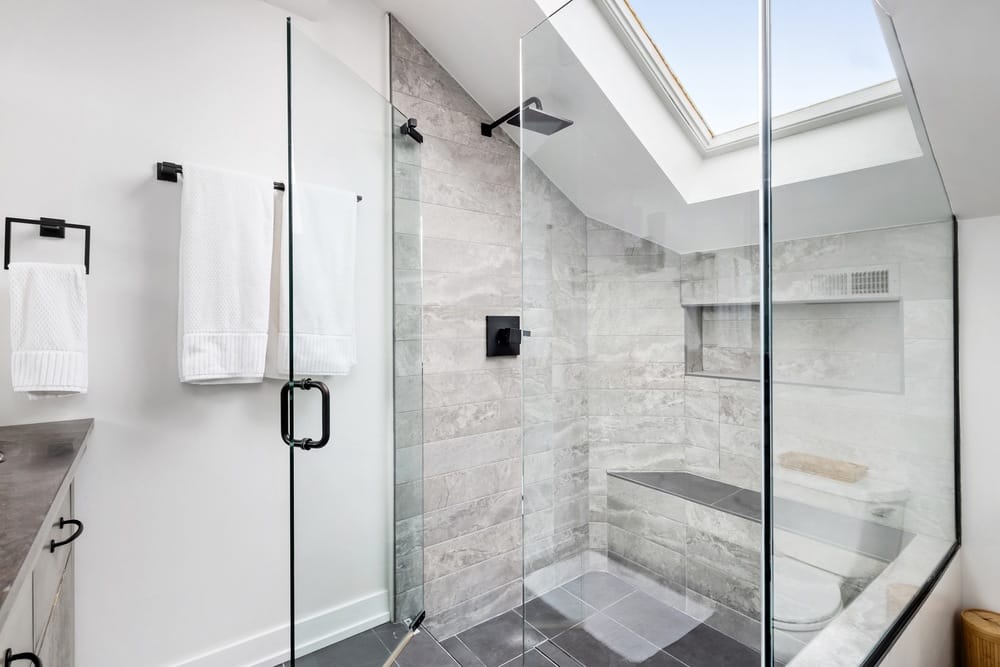
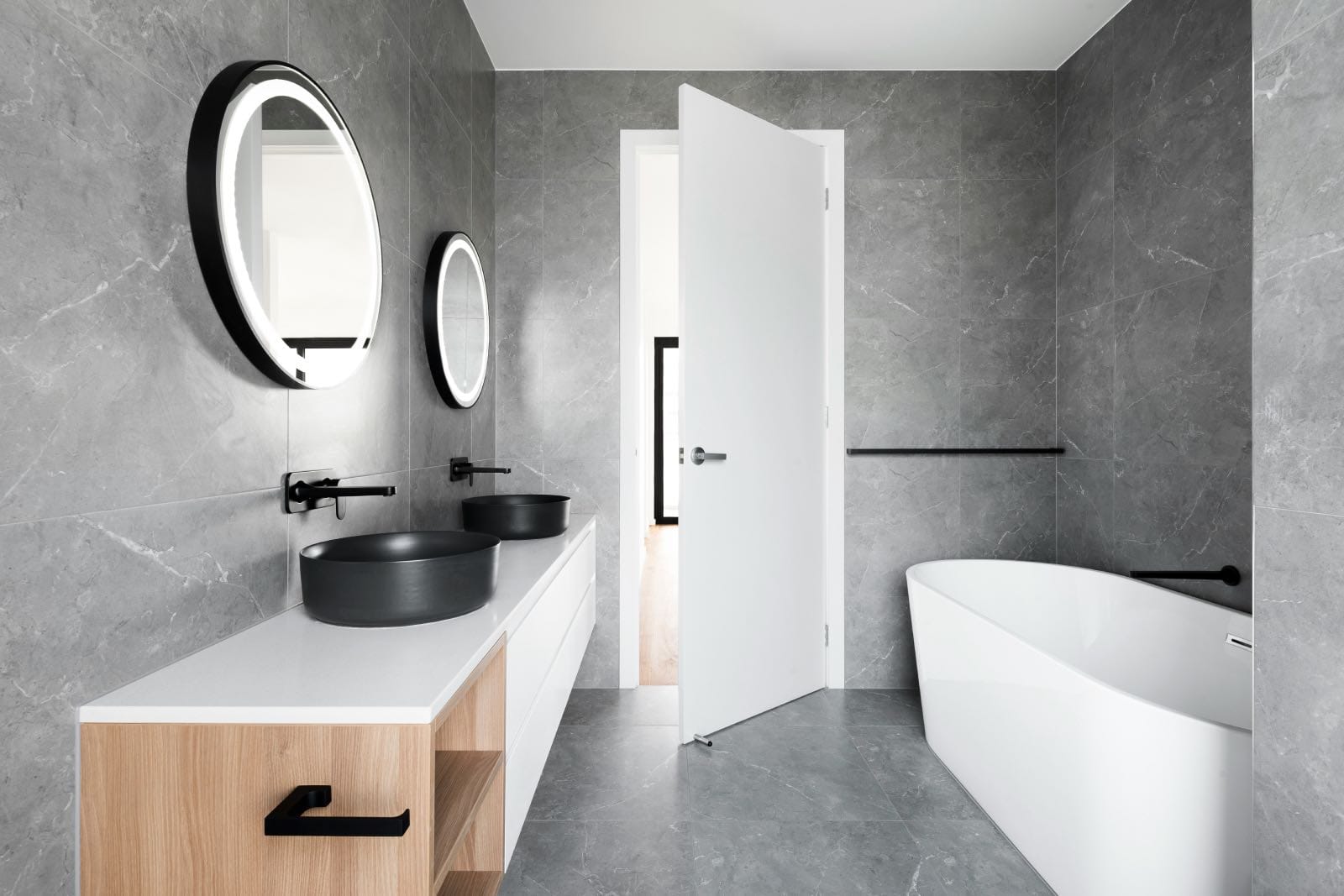
4. Customized and over-the-top designs
While personalization is the key to making your house feel like home, it's important to strike a balance that appeals to many potential buyers. Over-the-top designs or highly specific customizations can significantly limit the market appeal of your home, no matter how much you put into them.

Unique design choices, such as bold colors, intricate wallpapers, or unconventional fixtures, may deter potential buyers who prefer a more neutral palette or envision their personal touches in the space. You have to consider the broader market and potential resale value in your neighborhood when undertaking any renovation projects.
5. Removing closets and storage spaces
Eliminating essential spaces, such as closets or storage areas, can harm your home's value. Many buyers value the convenience and functionality of having a closet and storage space. You may devalue your home and limit its appeal by converting or eliminating closets and storage spaces.

Removing storage spaces can make it challenging for potential buyers to envision their belongings in the home. It may lead to concerns about insufficient storage capacity and turn buyers off.
6. Installing a swimming pool
While a swimming pool may seem like a luxurious addition, it can be a risky investment. Many potential buyers consider the maintenance costs, safety concerns, and personal preferences when evaluating a home with a pool.

Additionally, a pool may be less appealing or practical in areas with cooler climates or shorter summers. Not only can the installation and upkeep of a pool be expensive, but it can also limit your potential buyer pool, as some may see it as an additional expense or a potential safety hazard for families with young children.
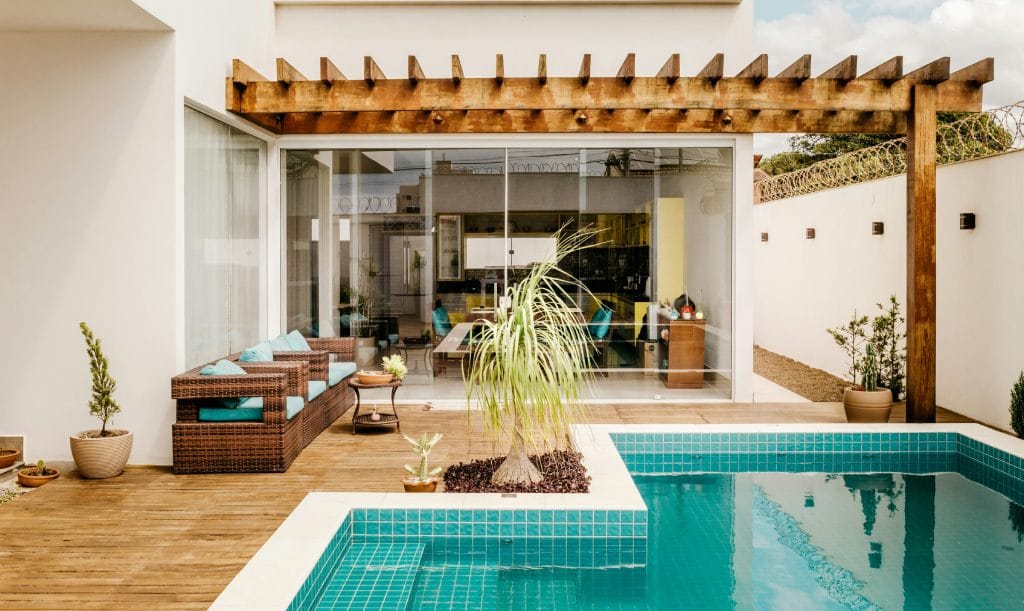
7. Too much carpeting
While carpets can add warmth and comfort to a home, excessive carpeting can be a turn-off for potential buyers. Many people prefer hardwood flooring or other hard surfaces that are easier to clean and maintain. Removing carpeting can be costly and not appealing to buyers.

Excessive carpeting can also give the impression of a dated or unkempt home. If you already have carpeted areas, consider incorporating other flooring options such as hardwood, laminate, or tile in key areas of the home.
8. Wallpaper everywhere
While wallpaper can add personality and charm to a space, you should exercise caution when using it excessively. Bold or outdated wallpaper designs can deter potential buyers, as they might not align with their taste or design preferences.

Removing wallpaper can be time-consuming and costly, which can discourage buyers who are looking for move-in ready homes. If you choose wallpaper, opt for more subtle or removable options that can be easily removed. Removable wallpaper allows for easy updates or removal if a buyer prefers a different look.
9. Garage conversions
Converting a garage into an additional living space may seem like a practical way to maximize square footage. However, removing or repurposing a garage can have a negative impact on your home's value. It can also limit the functionality and convenience that many buyers seek.

Many buyers consider a garage essential for parking, storage, or as a workshop area. Eliminating the garage can limit your home's appeal and make it less desirable for potential buyers who prioritize these functional spaces. It's best to carefully consider the impact of converting a garage before proceeding with such a project.
10. Over-the-top landscaping
While curb appeal is crucial, over-the-top or extravagant landscaping can be a double-edged sword. While a beautifully landscaped yard can attract potential buyers, too much landscaping or intricate designs can overwhelm or require significant maintenance.
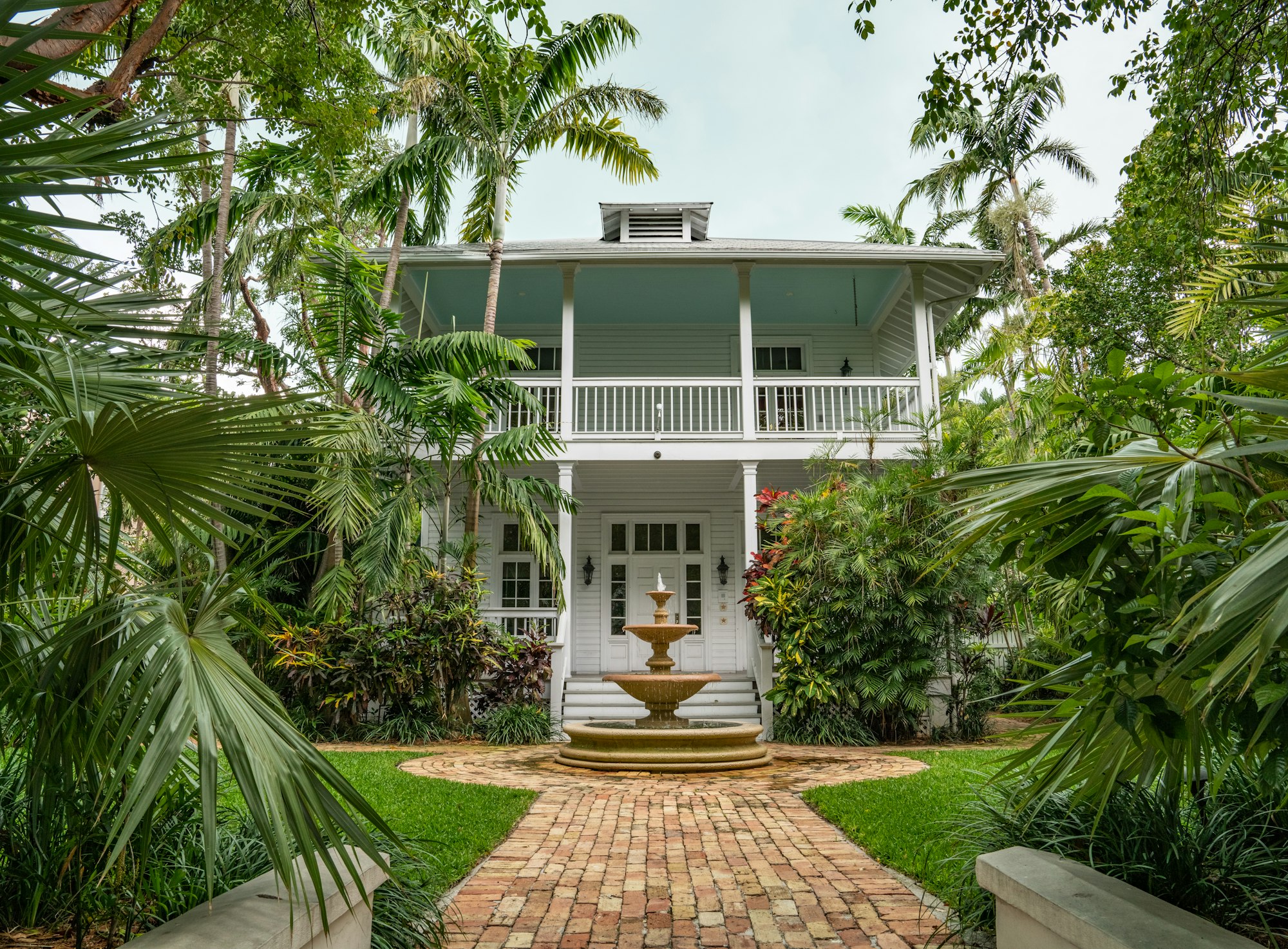
Buyers may be deterred by the prospect of having to maintain an elaborate landscape or worry about potential water consumption or ongoing costs associated with complex designs. Opt for a well-maintained and balanced landscape that appeals to a broad range of tastes.
Conclusion
Home renovations should be approached with careful consideration of their potential impact on your home's value. Projects that involve removing bedrooms, altering or reducing bathrooms, or eliminating essential spaces like garages and storage areas can harm your home's overall worth. Additionally, too-customized features and over-the-top designs may limit your home's market appeal.
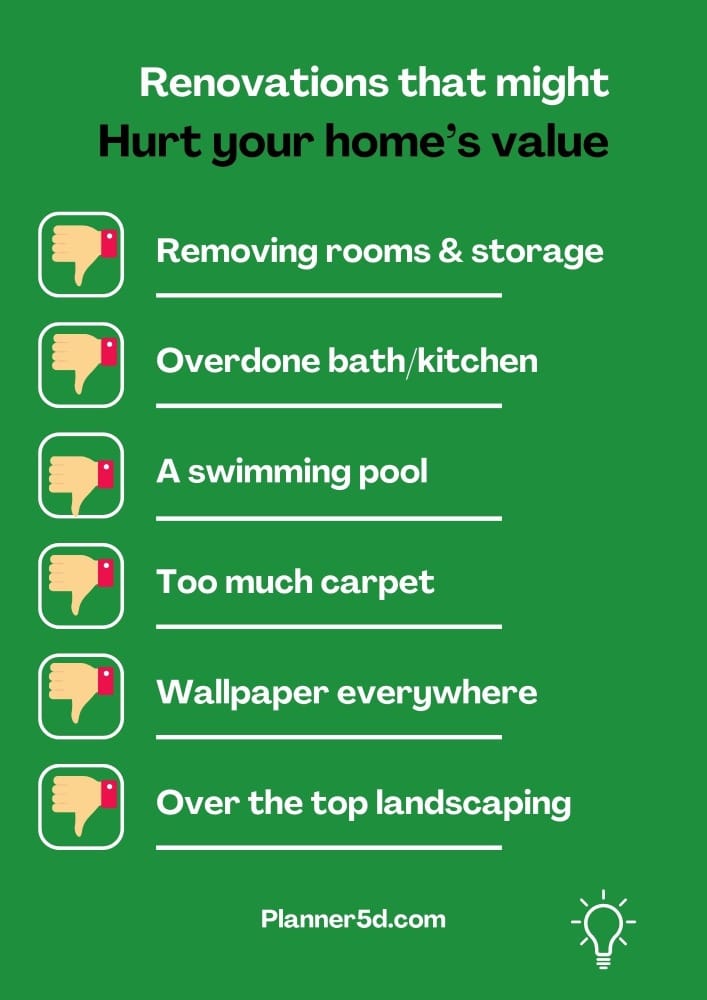
By avoiding these projects, you can ensure your home retains value and attracts a broader range of potential buyers. Consulting with your local real estate professional can provide tailored advice and insights about your property and local market conditions.
Did you know? You can use Planner 5D to plan your renovation so you can see how your home will look before starting any actual work. You can use your floorplans to consult with a real estate agent to get an idea of which renovations can bring you the most value for your home.
FAQ
Can a swimming pool increase the value of my home if I live in a warm climate?
While a swimming pool can be a desirable feature in warmer climates, its impact on your home's value may vary. Some buyers may see it as a valuable addition, while others may view it as a maintenance and safety concern.
Can unique features and customization add value to a home?
Unique features and customization can certainly add value to a home if they align with the preferences of potential buyers. However, very niche features may limit the buyer pool. Consult a real estate professional to assess the potential impact on your home's value before doing any work.
What are some essential upgrades that can enhance my home's value?
Upgrades that can enhance your home's value include modernizing kitchens and bathrooms, addressing structural or system issues, updating electrical and plumbing systems and energy efficiency. These upgrades make your home more appealing to potential buyers and offer increased functionality and comfort.
How can I make my home more energy-efficient during renovations?
To increase your home's more energy-efficient, consider installing energy-efficient windows, upgrading insulation and using energy-efficient appliances and lighting. These upgrades improve your home's value, help reduce energy costs, and can be attractive to potential buyers.
How can I create an attractive landscape without going overboard?
Creating an attractive landscape without going overboard involves finding a balance. Focus on well-maintained lawns, simple and elegant planters, and thoughtful hardscape elements. Emphasize curb appeal while considering potential buyers' preferences and maintenance expectations in your area.
